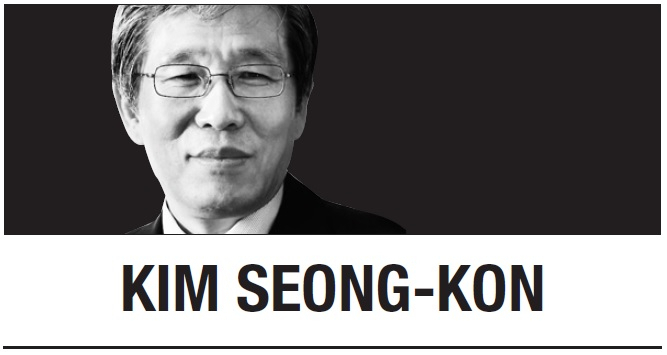
Recently, a Korean intellectual sent me a reporter’s interview with a well-known Korean scholar of East Asian philosophy, Im Gun-soon. Reading the intriguing interview, I found he rightly diagnosed the current maladies of our society and prescribed the remedies we urgently needed in order to survive and thrive in this era of global disruptions. As a Generation MZ philosopher, I believe he could not possibly be a conservative. Thus, I believe that his observations and opinions were those of a liberal who had common sense.
Reading the thought-provoking, provocative interview, I greatly admired Im's courage to expose the chronic problems of our society. In today’s South Korea, such courage is likely to come under fire, harshly criticized as “unpatriotic” behavior by self-appointed “patriots” and “radicals” rampant in our society.
In the interview, Im compared contemporary Korea to an egg. “The shell is modern,” he described South Korea, “but the white part is Confucian medieval, and the yolk is shaman ancient.” According to him, South Korea is modern on the outside only but its essence still belongs to the era of ancient shaman rituals and the pre-modern Joseon Dynasty era that ignored commerce and national defense as it was preoccupied with hollow Neo-Confucian formality and morality.
He came up with a myriad of examples that supported his claims. One of them is that in South Korea, no one can become a political leader if he has moral issues, no matter how trivial they are. Indeed, when the government nominates someone as a Cabinet minister, our lawmakers and reporters immediately investigate the person’s past life thoroughly in order to find any moral flaws that can destroy him. His competence does not matter at all. Surely, it is a remnant of outdated Confucian morality scuffles.
Another example is that in Korea surrogates of deceased ex-presidents can easily become political leaders due to the shamanism that remains so deeply rooted in the Korean people’s minds. For example, Park Geun-hye and Moon Jae-in became president without difficulty because they were surrogates of Park Chung-hee and Roh Moo-hyun, who had died by assassination and suicide respectively. Politicians who used the sunken Sewol Ferry tragedy for political gain were also taking advantage of this shaman sentiment pervasive in our society.
Another good example is that when a catastrophe happens in Korean society, our politicians are not interested in “Why?” Instead, they ask, “Who?” Then, they organize a hunting party to search for a scapegoat to blame. Therefore, instead of trying to prevent a similar incident from happening again in the future, our politicians just stage a political show resembling a shaman ritual to send the fall guy to prison.
According to Im, three lucky things happened to South Korea in recent history. The first lucky thing was that the Korean Peninsula evaded colonization by communist countries. Otherwise, South Korea would surely have become a poverty-stricken colony of a socialist country now, deprived of freedom, human rights and liberal democracy.
The second lucky thing was that South Korea, liberated by the US, belongs to the First World as a partner of America. As I recall, in the 1980s, anti-American student activists on the left wrongly labeled South Korea a “Third World country exploited by the US,” borrowing from Latin American leftists’ anti-Americanism.
In my opinion, ever since South Korea became an ally of America, it has been a strong, affluent maritime country. Therefore, it has always been a First World country, not a Third World country, in my view. The accusation that the US exploited South Korea economically is also far from the truth.
The third lucky thing for South Korea was that it could abolish social caste during the Korean War. Although the Gabo Reforms of 1894 started the campaign, the Korean War put an end to the caste system consisting of yangban, common people and serfs completely.
Im also pointed out that pre-modern South Korean left-wing radicals were reincarnated under the banner of “progressive leftists.” They denied modernity and thus had nostalgia for the Joseon era, denouncing the legitimacy of the birth of South Korea. That is why they downgraded the first South Korean President Rhee Syngman and dragged the people into the labyrinth of the dark past. In fact, so-called “progressive leftists” were hypocrites who secretly enjoyed privileges and wealth, while calling for equality and justice, according to Im.
In the eyes of many in Generation MZ, the unification between the North and the South is not possible at all, because they are under a completely different political system. Therefore, Im proposes that instead of clinging to ultra-nationalism or obstinately calling for unattainable unification, we should do two other urgent things first: sever our ties with the specters of shamanism and the relics of Confucianism.
If the rest of Korea’s Generation MZ is awake like him, South Korea’s future will be bright and prosperous.
Kim Seong-kon
Kim Seong-kon is a professor emeritus of English at Seoul National University and a visiting scholar at Dartmouth College. The views expressed here are his own. -- Ed.




![[Exclusive] Hyundai Mobis eyes closer ties with BYD](http://res.heraldm.com/phpwas/restmb_idxmake.php?idx=644&simg=/content/image/2024/11/25/20241125050044_0.jpg)
![[Herald Review] 'Gangnam B-Side' combines social realism with masterful suspense, performance](http://res.heraldm.com/phpwas/restmb_idxmake.php?idx=644&simg=/content/image/2024/11/25/20241125050072_0.jpg)

